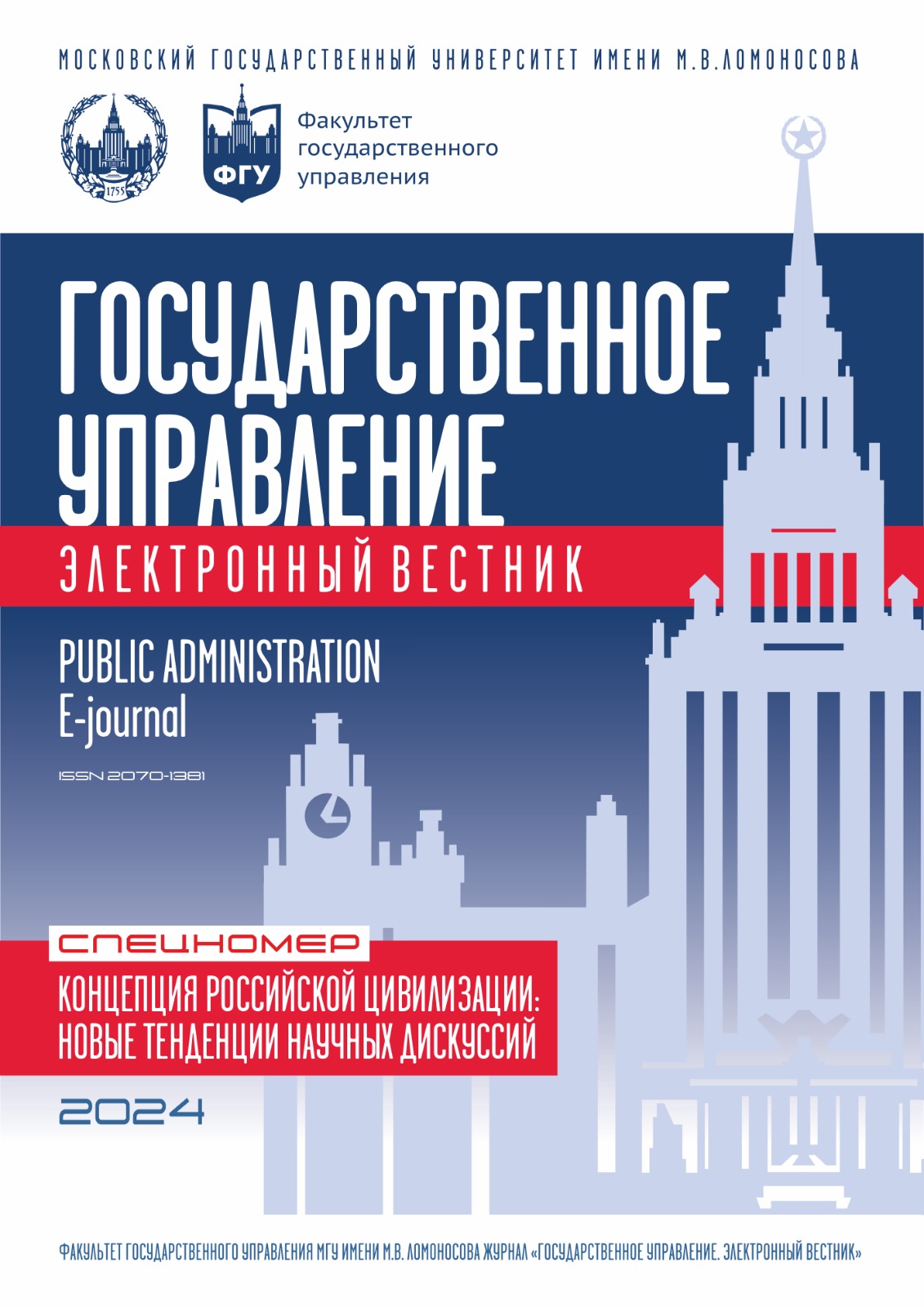On the Place and Meaning of World History in the Historiosophy of N.Ya. Danilevsky
DOI:
https://doi.org/10.24412/4gzf8y63Keywords:
World history, historiosophy, theory of historical process, theory of progress, civilization, N.Ya. Danilevsky.Abstract
The historical and philosophical theory of cultural and historical types formulated in Danilevsky’s “Russia and Europe” is often interpreted as opposing the world history concept. This is contradicted by the fact that Danilevsky himself uses the world history concept as a working concept and, moreover, expresses his substantive judgements on this subject. In our opinion, this circumstance is not a contradiction on Danilevsky’s part. According to the approach outlined in the article, first of all “Russia and Europe” is a political treatise and the primary issue discussed in it (and the corresponding plan of consideration) is the problem of action and the subject of action. A cultural and historical type, fully developed, is formalized into a system of states or a state (with the former option being preferred by Danilevsky as providing more opportunities for development). Thus, they also act as subjects of action in themselves, but at the same time their system is also capable of acting as such (the system of international law, which in Danilevsky’s time is fundamentally limited, first as the system of international law of Christian nations and then, since the 1860s, of “civilized” ones). World history appears exclusively in terms of theoretical comprehension. It follows that it is impossible to act from world history — that is to speak on behalf of history. Danilevsky’s thesis itself appears to be complexly structured, disintegrating into two parts: the absence of such a historical subject as mankind and the impossibility to speak about “meaning in history” within the framework of positive scientific knowledge. It is noted that both parts of the thesis are autonomous and thus can be discussed separately, i.e. the refutation/rejection of one does not automatically mean the rejection of the other.
References
Балуев Б.П. Споры о судьбах России: Н.Я. Данилевский и его книга «Россия и Европа». Тверь: Издательский дом «Булат», 2001.
Бультман Р. История и эсхатология. Присутствие вечности. М.: Канон+, РООИ «Реабилитация», 2012.
Данилевский Н.Я. Россия и Европа. СПб.: Азбука, Азбука-Аттикус, 2023.
Данилевский Н.Я. Россия и Европа: с посмертными примечаниями, статьей К.Н. Бестужева-Рюмина и комментариями. М.: Родная старина, 2017.
Ефремов А.В. Борьба за историю: концепция Н.Я. Данилевского в оценке современников. М.: Горячая линия — Телеком, 2023.
Жирмунский В.М. Жизнь и творчество Гердера // Гердер И.Г. Избранные сочинения. М., Л.: Государственное издательство художественной литературы, 1959. С. VII–LIX.
Кареев Н.И. Историко-философские и социологические этюды. СПб.: Издание СПб. Акционерного общества печатного дела «Издатель», 1899. С. 426–469.
Лёвит К. Смысл в истории: Теологические предпосылки философии истории. СПб.: Владимир Даль, 2021.
Лосский Н.О. Учение о перевоплощении. Интуитивизм. М.: Прогресс, VIA, 1992.
Рудницкая Е.Л. Шестидесятник Николай Ножин. М.: Наука, 1975.
Сидорин В.В. К творческой истории «России и Европы» Н.Я. Данилевского: о черновике трактата в Отделе рукописей РНБ // Творческое наследие Н.Я. Данилевского: история и современность / отв. ред. В.В. Сидорин. М.; СПб.: Центр гуманитарных инициатив, 2024. С. 83–94.
Соловьев Вл.С. Национальный вопрос в России. М.: Рипол-Классик, 2018.
Тесля А.А. Русские беседы: уходящая натура. М.: РИПОЛ классик, 2018.
Тесля А.А. Н.И. Кареев как интерпретатор Н.Я. Данилевского // Творческое наследие Н.Я. Данилевского: история и современность / отв. ред. В.В. Сидорин. М.; СПб.: Центр гуманитарных инициатив, 2024. С. 74–82.
Downloads
Published
Issue
Section
Categories
Similar Articles
- Alexander S. Levchenkov, Historical Policy in the Post-Soviet Space (on the Example of the Memory of the Great Patriotic War) in the Context of Modern Geopolitical Transformations , Public Administration. E-journal (Russia): No. 113(S) (2025): Стратегии государственного управления в годы Великой Отечественной войны
- Yuriy Yu. Petrunin, Aleksandr V. Sidorov, Konstantin A. Solovyov , Methodological Tasks in Preparing Textbook “History of Management Thought” , Public Administration. E-journal (Russia): No. 101 (2023)
- Roman V. Evstifeev, “Civilization State” Concept in the Works of Non-Western Scholars , Public Administration. E-journal (Russia): No. 104(S) (2024): The Concept of Russian Civilization: New Trends in Scientific Discussions
- Vladimir I. Shmakov, Main Directions of Modern Transformation and Modernization of Russian Society, Ways to Overcome the Systemic Crisis in the Context of Technological Revolution: Alternative Strategic Development Models , Public Administration. E-journal (Russia): No. 105 (2024)
- Dmitry G. Evstafiev, Eurasian Civilization: Conceptual Geo-Economic Framework in the Context of a New World Order , Public Administration. E-journal (Russia): No. 104(S) (2024): The Concept of Russian Civilization: New Trends in Scientific Discussions
- Vyacheslav A. Nikonov, A New Member of BRICS — Egypt , Public Administration. E-journal (Russia): No. 105 (2024)
- Vyacheslav A. Nikonov, New BRICS Member — United Arab Emirates , Public Administration. E-journal (Russia): No. 108 (2025)
- Sergei Yu. Glazyev, Aleksandr S. Voronov, Marianna V. Kudina, Liubov N. Orlova, Forecast of Human Capital Development in the Russian Federation in the Context of GlobalEconomy Changes , Public Administration. E-journal (Russia): No. 91 (2022)
- Elena M. Likhodey, Development of Youth Policy in the Russian Federation in the 1990s , Public Administration. E-journal (Russia): No. 96 (2023)
- Dina A. Amanzholova, Features of Constructing the Memory of the Great Patriotic War: An Example of the Former Soviet Republics of Central Asia and Kazakhstan , Public Administration. E-journal (Russia): No. 113(S) (2025): Стратегии государственного управления в годы Великой Отечественной войны
You may also start an advanced similarity search for this article.




